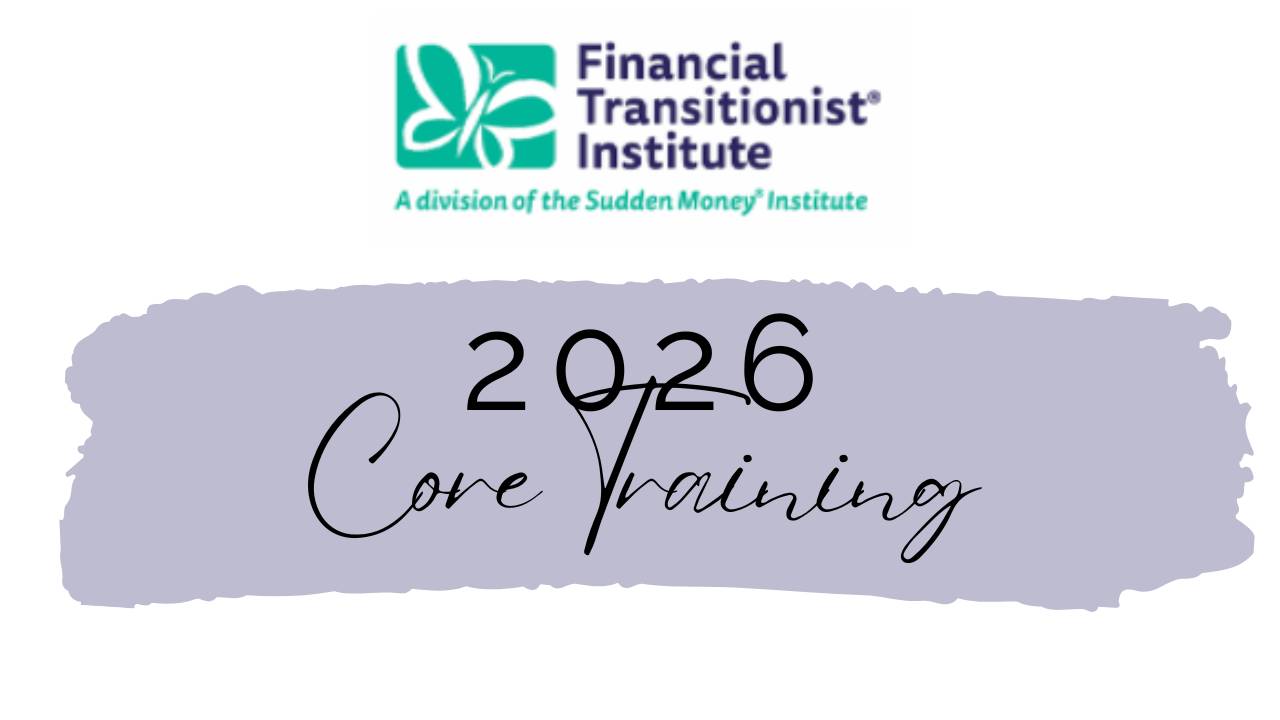Financial Transitions Planning: The Time is Now
May 30, 2018
Written by Susan Bradley
“These days, nearly 90% of my clients are going through major life transitions. Sometimes I don’t even want to know the details about what they are experiencing and feeling because I don’t have answers for them. And I’ve always thought I’m a good advisor! After 29 years of practice, I still haven’t been trained to help clients with the non-technical, human side of transition. My time has come.” I recently traveled to Arizona, Colorado, and Texas, where I had the great pleasure of speaking to financial advisors, keynoting, and leading workshops on the topic of the Age of the Human. The sentiment above, shared by one of the advisors in the group, nearly stopped me in my tracks. Because his words say practically everything about what it takes to transform good financial advisors into fantastic financial advisors.
Noticing Life’s Transitions Isn’t Enough . . .
Today, more than ever, we live in a world that resembles a giant merry-go-round of technology, globalization, and change of every ilk. It’s not hard to understand why the Age of the Human is now upon us. At times, each of us probably feels like just one more blurry-eyed rider trapped on that merry-go-round spinning ever faster. It’s enough to make anyone want to hop off to feel human again. While this merry-go-round metaphor extends far beyond the world of financial planning, for many of our financial planning clients today, sheer demographics make the acceleration feel even greater. Simply put, our clients aren’t getting any younger. They’re reaching the age when life naturally includes more critical pivot points and upheavals. Careers – and even long, seemingly bulletproof marriages – end. Businesses are sold. Spouses die. Inheritances happen. Elderly parents require care. Adult children come back home to roost. Hopes and dreams evolve. The changes can waft in one by one, or they can blow through in an overwhelming whirlwind. We’re good advisors. We know how to advise our clients technically. But that’s not enough. What our clients are experiencing can at times be so exhilarating, stressful, overwhelming, devastating, or even downright terrifying that they can’t possibly see their way to a good decision, financial or otherwise. Nor can they see how life transitions, whether by design or happenstance, affect not just their finances, but their emotions, their relationships, their sense of personal identity, their decision-making – their lives. As advisors, our expertise simply can’t end at the technical level. It’s more than our challenge – it’s our job – to see not only someone’s finances but also to see past them, into the human elements that drive every decision. To once again quote the advisor who so aptly pinpointed what many of us have been lacking in our client relationships, “We have to be able to look through the trees to see the forest.”
We Need to Fill this Gap
To be not just good, but exemplary advisors, we need specific skills, processes and tools to help people whose lives are spinning and shifting, to help them get their feet back safely on the ground. The good news is that, like the advisor I met last week, most of us recognize what we need to do. We realize that to thrive and help our clients do the same, we have to understand, honor and advise our clients as human beings. Therefore, if we haven’t already done so, we must commit the time, energy, and practice it takes to develop the knowledge and skills essential to doing our job best.
What exactly does that mean?
We must learn to:
- rely on science-based processes, protocols and tools that are repeatable for clients when they face subsequent transitions and that are multi-applicable no matter what transitions our clients face
- understand how one’s brain is affected during times of upheaval and stress
- help clients use stress to protect and preserve their cognitive abilities
- ask questions with curiosity and know what to do with the answers
- listen deeply and observe closely to identify behaviors and patterns indicating what motivates clients’ decision-making
- keep clients safe even when there are no immediate answers
- tune in to and refine our behaviors to better support and help clients in transition
Whether you achieve all this through a program of rigorous self-study and practice or become trained and certified through the Financial Transitionist® Institute, the most important thing is that you DO achieve it. Whatever course you choose will take time, practice and true dedication to ongoing learning. And it will all be worth it.
Your clients are counting on you to guide them through their transitions!
The Age of the Human is here. Your clients face a myriad of human transitions affecting far more than their finances. They’re counting on you to help them off that merry-go-round. They’re counting on you to see those trees. But more importantly, they’re depending on you to guide them through the forest beyond. When you integrate the technical and human skills to make all that happen, you’ll be far more than just a “good” advisor, you’ll be on your way to becoming a world-class advisor! If you want to learn more about Financial Transitions Planning, check out these Introductory Events. And if you’re ready for a unique experience of education and community, apply now for our yearlong Core Training beginning in June or October
Stay connected with news and updates!
Join our mailing list to receive the latest news and updates from our team.
Don't worry, your information will not be shared.
We hate SPAM. We will never sell your information, for any reason.

